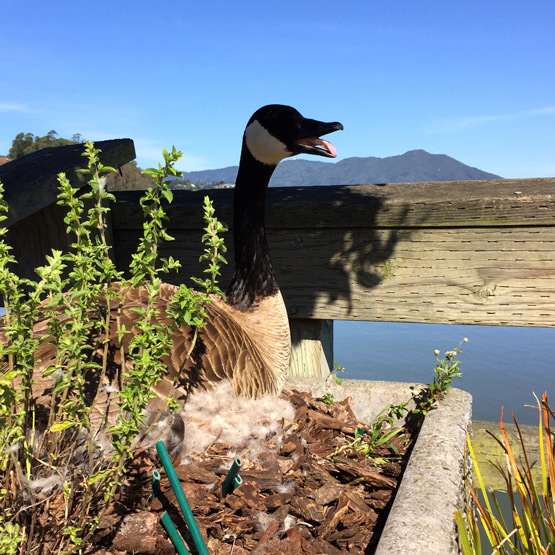
These are trying times. Canada Geese are nesting on our docks, in our planter boxes and on occasion on our rooftops. It can be particularly unnerving to be walking down the dock—lost in thought—only to be jolted to attention by the sudden hiss of a Canada goose. Rumors abound, which—even if half of them are true—provide us with more than enough cautionary tales. On East Pier, one clutch (situated half-way down the dock) fell prey to raccoons, while a 2nd attempt—in the same location—was destroyed by people. The geese have moved down to a planter box at the end of the dock, where they are less likely to be disturbed, and there is good reason they might be successful on their 3rd try. If we give them the wide berth they need.
We’ve heard of similar situations over on West Pier, where another nest in a planter box (also inopportunely located midway along the dock) was destroyed. As much as we might sympathize with the desire to take action, we’d like to highlight that it is illegal to disrupt or destroy migratory bird’s nests, or to otherwise mess with the young offspring. Please tell your neighbors and please ask tourists (who very likely are unaware of these regulations) to maintain a respectful distance. Despite the “Do Not Walk on the Grass” signs posted on Kappas Green, or the occasionally soggy nature of the Green itself, that may be your only option if the geese are on the gravel path.
Regulations: Almost all birds, including their nests and eggs native to the United States are protected under the Migratory Bird Treaty Act (MBTA).
Nesting: Nests can be large mounds, or depressions, of vegetation—lined with down. The nest is usually located within sight of water—4 to 7 white eggs make up a typical clutch—and the incubation is done solely by the female. The gander (male) zealously guards the nest and will attack any intruders. Incubation takes 25 to 30 days and the goslings are led to water within a day after hatching. The goslings then stay with the parents until the following spring.
Related posts:
Brave New World as Ducklings Hatch